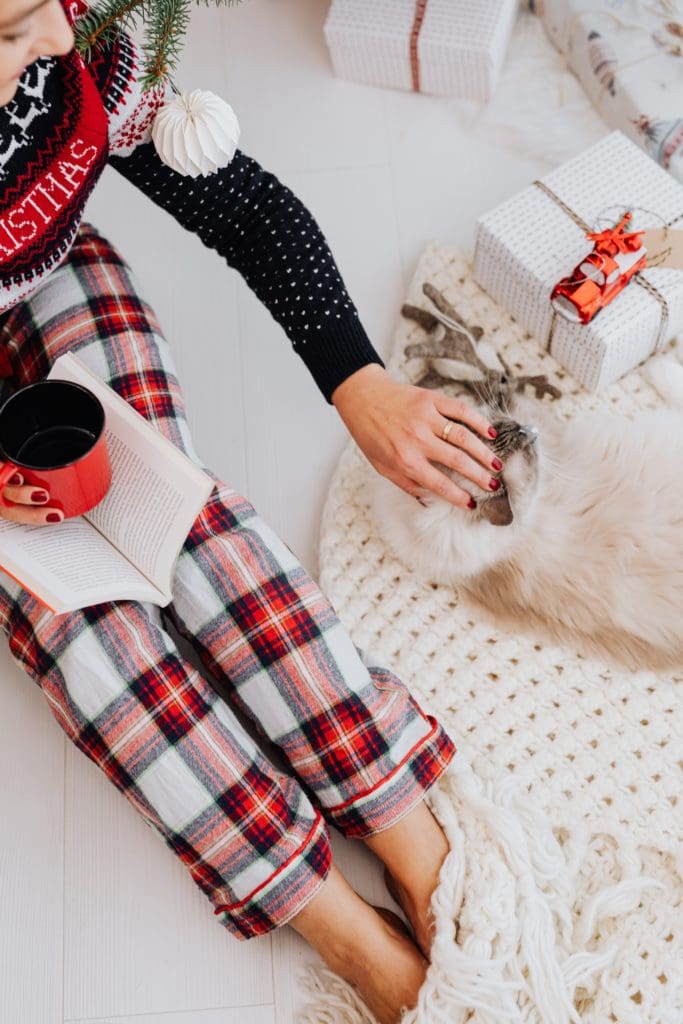The holiday season is underway, but if you are a pet parent, putting up that Christmas tree can cause anxiety, as you wonder if that four-legged family member will behave. While the holidays can be full of joy, they can often be a dangerous time for our pets. Ringing doorbells, decorations, and food and drinks could end up with your four-legged friends needing emergency care. And given that many clinics and private practices close for several weeks during the holidays, delays can often be exacerbated over the holidays. Dr. Jo Myers, practicing veterinarian with Vetster, is an expert in what to do and what holiday table scraps to avoid, along with best practices for reducing anxiety. We chatted with her to find out more. —Noa Nichol

Hi Dr. Myers! Please tell us a bit about yourself to start.
Hello! I’m a veterinarian with more than 25 years of clinical experience, and I’ve been helping pet parents online for more than a decade. I love all kinds of animals, but my practice has always focused on dogs, cats, pet birds, and small pocket pets. I’m passionate about helping pet parents and veterinarians connect on Vetster as we build the technology that will drive the future of veterinary medicine.
Why and how can the holidays be a dangerous time for pets?
The holidays can be a dangerous time for pets for many reasons. We tend to be more distracted and busy this time of year, and our normal routines tend to get interrupted. The holidays are a popular time for travel, so escapes are a big concern. We’re socializing with unfamiliar people and other pets, so accidents are more common. When we have people over, our pets may end up having access to their belongings and consuming things they shouldn’t have like food, medications, or cigarettes. Holiday decorations and even the presents we give our pets may not have their safety in mind. All of this is complicated by the fact that it’s usually harder to access veterinary care during the holidays or when you’re out of town, away from your usual vet.
What holiday food/scraps should we keep dogs and cats away from? What are your top tips on how to do so?
It’s important to avoid feeding large servings of anything your pet isn’t used to. Eating more than a bite or two of anything rich, fatty, or unusual—cooked or raw—can cause intestinal issues and stomach upset. Dogs are at especially high risk for a life-threatening bout of pancreatitis when they overindulge in a fatty meal. Bones can be dangerous, too—they’re sharp enough to cause injuries and hard enough to break teeth and can also get stuck in the mouth or cause a blockage in the digestive tract. Raw or uncooked meat can be bad for pets, just like it is for people, and eating it can cause food poisoning. Rising dough with activated yeast is another common holiday hazard. You mix it up and set it out to rise, then Fido finds it once you’ve moved on to the next holiday meal prep task. Of course, he eats the whole thing, and – especially if he’s a small dog – those yeast will produce enough alcohol to be dangerous, not to mention the potentially life-threatening degree of bloat that occurs. Some foods that are safe for us to eat are toxic to pets when consumed in dangerous amounts. These include onions, garlic, leeks, scallions, chocolate, caffeine, grapes and raisins, and macadamia nuts. To prevent your pets from getting into these holiday hazards, keep food out of reach, don’t allow pets access to the kitchen, and ask guests not to feed pets. When having visitors over, keep the door to the coat roam closed and remind visitors to keep hazards out of reach. Remain vigilant and don’t get distracted when it comes to leaving leftovers out on the table or securing the garbage can.
In terms of gifting, what should one consider when choosing the right toy for their pup or kitty this holiday season?
There are a lot of great toys that are fun and safe but avoid potential hazards including anything stringy that could end up being swallowed, anything hard enough to break teeth when chewed, toys with batteries, magnets, or small parts that can be easily broken or removed, and anything scary—including toys that move too fast, have flashing lights, or look like a predator. You know your pet and how they’re likely to react, so keep it fun. Remember that the best gift is usually your time, attention, and the opportunity to play together. Your dog probably wants a chance to run around with you outside or a long massage session more than they want another toy. Keep in mind that social rituals matter to particularly social pets. Many dogs enjoy unwrapping presents along with the rest of the family. If you opt to let them do that (with supervision, of course), it matters less what’s inside.
For those of us travelling for the holidays, what’s your best advice around keeping pets safe and stress-free in a kennel or doggy daycare?
It’s important to first do your research. Be sure to ask your fellow pet parents, your veterinarian, or any other trusted professional who works with animals specific questions, such as: Do they carry any required licenses or insurance? How big are the kennels? Are animals boarded in individual kennels? How many attendants do they have on staff? How frequently is the facility cleaned? How often do they let animals out for free play and to go to the bathroom? Will my dog be playing with other dogs? What happens if my pet gets sick or injured?Make an appointment to drop by a boarding facility before boarding your pet for the first time to see for yourself how much room the animals have and what the attendants are like. Book your pet a night at a kennel and see how they do. If your pet comes back to you in good shape—and perhaps doesn’t seem to want to leave the kennel attendants—that’s a good sign. Before you can book a stay at a boarding establishment, your pet must meet certain requirements. Ask what vaccines are required. For dogs, the vaccines usually required for dog boarding are the distemper combo (DA2P for distemper, adenovirus, parvovirus, +/- parainfluenza), rabies, bordetella (one of the pathogens associated with kennel cough) and influenza. For cats, kennels usually require the feline distemper combo (rhinotracheitis, calicvirus, and panleukopenia) along with rabies and feline leukemia vaccines. Make sure all vaccines are up to date. It’s important to bring your pet’s collar and tags along. Kennels are generally secure, but for some particularly intelligent or rambunctious dogs, there’s always an escape risk. Make sure kennel attendants are familiar with your pet’s medication regimen and what they need to do to properly administer it. Bring a copy of your pet’s vet records—especially vaccination records—as well as pet insurance details. Have a plan in case your pet needs veterinary care while you’re away.
Best ways to enjoy the holidays with our pets?
The best ways to enjoy the holidays with our pets are similar to the ways we enjoy them with the people in our lives. Spend time together making memories by doing something fun. Go outside (when appropriate). Take pictures together, then put down your phone and interact with them (or don’t interact—in the case of cats or other pets who prefer peace and quiet). Don’t force them to interact with other pets or people outside their comfort zones. They should always be allowed to escape to somewhere quiet that feels safe. Maintain their routines as much as possible. Let dogs be dogs and cats be cats. Don’t force them to do “People Things” if that’s not their jam. Be aware and prepared in the event of an emergency so you can get your pets the care they need.

Be the first to comment